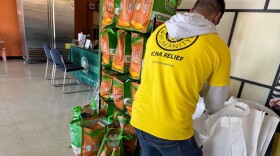-
Refugees and asylees are among those who can no longer qualify for federal nutrition support until five years after obtaining green cards.
-
Syrian refugee Nashat Aljerwan and his family were set to arrive in St. Louis in February. Then an executive order halted their plans.
-
Documentary special "The Fall of Saigon: 50 Years Later" features the stories of St. Louis-area refugees, sponsor families and U.S. veterans.
-
The popular, multicultural festival will return to Tower Grove Park in St. Louis on Aug. 23-24.
-
Welcome Neighbor STL is tutoring refugees in middle and high school. However, the organization desperately needs volunteers. Tutors are needed to help students with all subjects, especially math and reading.
-
Staff members and teachers from the Nahed Chapman New American Academy presented a petition in support of the program after SLPS leadership announced the program would be undergoing major changes.
-
After the Trump administration paused immigration efforts in January, the effects on families across the nation have been devastating. One Afghan man says his family members who were supposed to arrive in February are in limbo, and he needs St. Louisans to advocate for refugee resettlement funding.
-
Resettlement agencies and immigrant and refugee service providers in the St. Louis region have begun to scale back services for immigrants and refugees due to Trump’s executive order to pause federal funding.
-
About 250 community members gathered in Chesterfield on Sunday to celebrate the ousting of Syrian President Bashar al-Assad.
-
Arrey Obenson, former CEO and president of the International Institute of St. Louis, resigned because of misaligned visions and goals. He said the institute’s position as a service provider for immigrants and refugees should be widened.
Play Live Radio
Next Up:
0:00
0:00
Available On Air Stations










